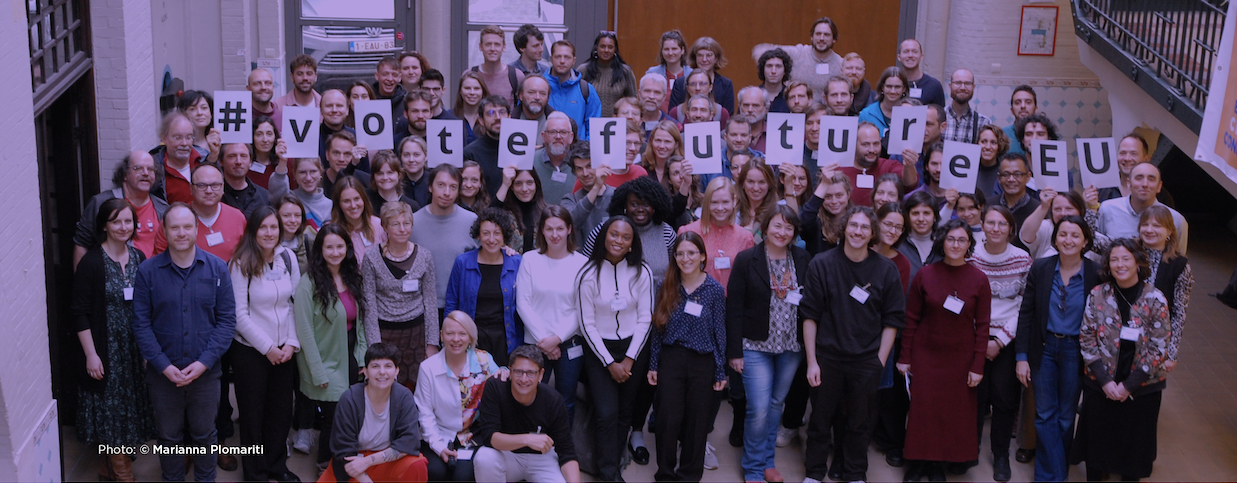Prioritising Climate Action in an era of rising threats to Democracy and Global Justice
The global climate movement started 2024 with mixed emotions. The previous year ended with CAN’s tireless global efforts being rewarded with the historical mention in the COP28 outcomes in Dubai for the need for the global economy to “transition away from fossil fuels”. However, as 2024 began, there was a deep awareness of the global order being in turmoil, escalating wars and violence in particular in the Middle East and Ukraine, and attacks on democracy, peace, and climate action across governments and civil society.
Operating within this context, the 200+ members of CAN Europe embarked on an unprecedented effort to coordinate and maintain a bold voice for ambitious climate action. These efforts had a clear focus on social justice across all areas of CAN Europe’s work, and with a particular focus on campaigning for people and the planet in advance of the European Parliament elections in June.
The EU’s focus and attention in 2024 was indeed dominated by pre- and post-election debate. In alliance with the main European environmental and climate civil society networks, CAN Europe and its members delivered clear messages to candidates and policy stakeholders at different levels calling for a fossil fuel-free, socially just, and climate neutral European Union. CAN Europe wanted to be clear in recognising the unprecedented set of climate, energy, and environment legislation passed in the previous five years, under the European Green Deal. But there was also the need to raise the ambition of climate action, address legal loopholes, and fill both the effort and massive investment gaps that are needed to deliver a just transition; and crucially, support the most affected people and parts of society, many of whom are already disproportionately affected by inequality and the climate crisis.
Countering the growing backlash against climate policy, CAN Europe responded with evidence and clarity, showing the economic and social benefits of “Paris Agreement-compatible” climate action, and demonstrating the healthy and crucial role of EU regulation in holding governments accountable.
CAN Europe continued with the pre-election campaign approach and showed its collective strength during the establishment of the new European Commission. This meant influencing and remaining steadfast on the messages and goals established at the start of the new EU cycle, ensuring input and critical and constructive monitoring through the formation of the new European Parliament, all new commissioners, and for the re-election of the European Commission President, Ursula von der Leyen.
It cannot go unrecognised that 2024 was the hottest year since recording began and the devastating effects of the climate crisis rising globally – including within the borders of the European Union. The floods in Valencia, Spain, became yet another iconic symbol in the European debate about inaction and unpreparedness, and which regrettably fuelled misinformation and political manipulation rather than drawing attention to the scale of both the emergency and implementation of solutions needed to meet the challenges.
Together with its global network, CAN Europe actively contributed to the collective global civil society pressure applied during COP29 in Baku calling for a New Collective Quantified Goal (NCQG) on climate finance. There was a bold call: for a financial shift requiring the wealthy and historically polluting countries from the Global North to contribute trillions to those in the Global South, the ones most impacted by the climate crisis and the least responsible for it. These campaign efforts made a ripple, but did not receive the attention or success they deserved in the disappointing and “business as usual” outcome in Baku. The Baku outcome has been assessed as failing to recognise the scale of the needs and the pace of the emergency that humanity and the planet are currently facing. But the pressure will continue from Baku to Belem.
Unfortunately, 2024 also ended with a worrying escalation of attacks on EU NGO funding which may be attributed to the rise of the far right and threatening democracy and participation, the very pillars of the European project. However, 2024 saw the climate movement uniting and persevering. CAN Europe is committed to organising even more to continue to help bring about a more just and sustainable world.
It is now a decade since the Paris Agreement was signed – with the targets still an absolute imperative. In 2025, CAN Europe will continue to demonstrate that those goals and the green transition are possible. And that it is not just an imperative for the planet, but meeting the targets will bring social and economic benefits, and a more peaceful future.

The battle for climate finance took centre stage in CAN Europe’s 2024 international campaigning and advocacy work, all of which supported CAN International priorities.These activities were particularly focused on the failure of rich countries to meet their obligations on loss and damage financing and the struggle for agreeing an ambitious NCQG at COP29.
Using the defining slogan, “pay up”, CAN Europe applied sustained and direct pressure on decision-makers to urgently redesign the international financial architecture to ensure sufficient and equitable finance -and calling on wealthy nations to pay up.
At the European level, CAN Europe held the EU accountable for its contradictions; positioning itself as a climate leader, while failing to fight for systemic financial transformation, failing to end fossil fuel subsidies, and showing weak support for phasing out oil and gas. CAN Europe’s advocacy increasingly framed these failures as part of a broader structural problem: the need for a fundamental transformation of the global financial architecture, driven by justice and equity.
In the EU’s neighbourhood, CAN Europe’s work continued to advocate for advancing climate ambition that is aligned with EU legislation. In the Western Balkans, the Energy Community Treaty continues to be used as a foundation to push for climate neutrality aligned with the Paris Agreement. In Türkiye, through collaboration with local partners, CAN Europe actively advocated for coal phase out and just transition while pushing for a Paris compatible climate law and other policy reforms to enhance ambition and ensure compliance with international climate commitments and alignment with the European Green Deal.
As a European movement embedded in a global network, CAN Europe worked to strengthen cooperation with CAN International and the other CAN nodes, aiming towards a balanced and decolonial partnership, particularly on the topics of finance, loss and damage, and the just transition. The EU-Latin America link was especially significant in 2024, as Brazil assumed the COP30 Presidency and climate justice narratives gained momentum. The coordinated engagement across CAN International nodes and regional alliances allows for more equitable decision-making, resource distribution, and movement-led leadership in global climate governance.
CAN Europe’s impact is driven by its members. In 2024, over 80 organisations across Europe were regularly engaged in CAN Europe’s work to influence international climate policy, ensuring civil society remained a coordinated, influential, and disruptive force in global negotiations. At COP29, CAN Europe enabled 45+ member organisations to engage directly with MEPs and EU decision-makers including Wopke Hoekstra, the European Commissioner for Climate, Net Zero, and Clean Growth. Through collective advocacy, disruptive actions, communication and strategic pressure, members played a pivotal role in pushing for:
• Stronger climate finance commitments that reflect historical responsibility
• An end to the era of fossil fuels, with no loopholes or false solutions
• A just and equitable transition, ensuring frontline and marginalised communities lead the process
• Robust human rights protections and civic space safeguards in climate policy
One of the defining moments of 2024 was when, during stalled NCQG negotiations, the global CAN network ramped up advocacy pressure on traditional donor countries, including the EU. The wider CAN- coordinated campaign calling on countries to “pay up” reached millions around the world after images of climate activists were used by countless news outlets around the world. While the final outcomes fell short of what was needed, CAN Europe’s coordinated advocacy and communications ensured the EU remained under immense pressure to increase financial commitments, securing a pledge to raise climate finance by USD 300 billion annually by 2035, with an aspiration to mobilise USD 1.3 trillion per year from public and private sources.
While these steps signal progress, CAN Europe remains committed to ensuring climate finance is not just increased, but fundamentally transformed. The solution is to see finance as deeply interwoven with the urgent phase out of fossil fuels (and associated subsidies), and by passing control of the global climate transition to frontline communities.
The geopolitical landscape became increasingly complex in 2024. Undeterred, CAN’s global network has played a crucial role in keeping climate justice and the imperative of a 1.5°C-aligned development pathway at the forefront of EU international diplomacy. Through coordinated advocacy, mobilisation, and high-level engagement, CAN Europe has maintained pressure on decision-makers, ensuring that equitable climate action remains an imperative that cannot be ignored.
During 2025, CAN Europe will continue its strategic work to transform EU climate diplomacy including pushing for justice-driven reforms, a fossil fuel-free future, and a globally equitable finance system. Advocacy will focus on influencing the EU’s positioning ahead of COP30 (“the justice COP”) and bi-regional diplomatic moments, strengthening the next Nationally Determined Contributions (NDC) cycle, and fighting for systemic reforms that unlock the socio-economic benefits of the climate transition for all. Together with allies, CAN Europe already has established a strong channel with the Brazilian presidency and will continue this effort with other key international players. CAN Europe will continue to proactively build the future of European climate action, not just respond to crises. As a formidable force in EU climate diplomacy and global climate action, CAN Europe will continue to push the boundaries of what is politically possible.

CAN Europe Headquarters
Mundo B
Rue d’Edimbourg 26
1050, Brussels
Belgium
Tel: +32 (0) 28944670
CAN Europe empowers civil society organisations to influence the design and development of effective climate change policy in Europe, both in the European Union as well as in its Member States and in European countries outside the EU.
© Copyrights 2025. All Rights Reserved.